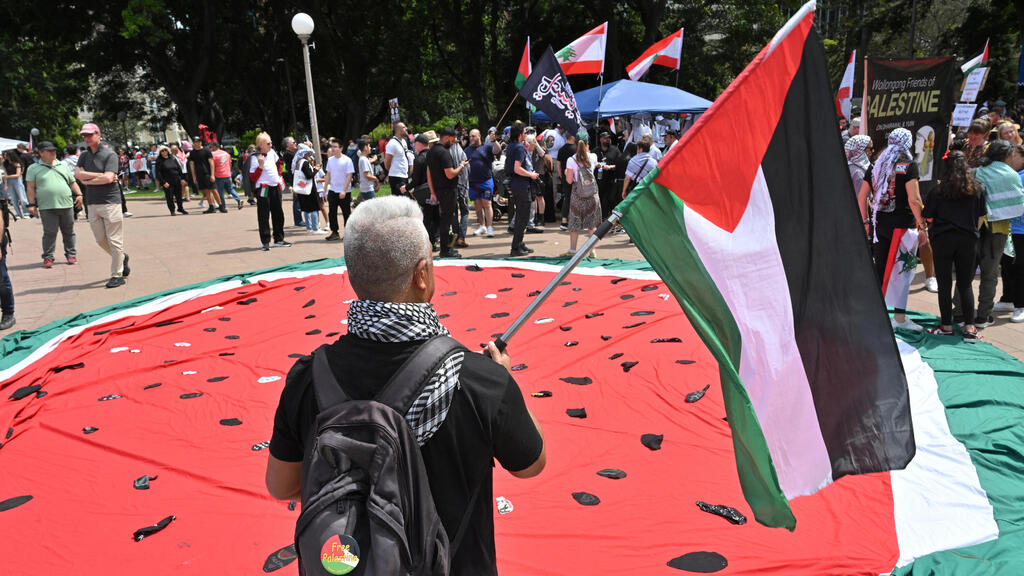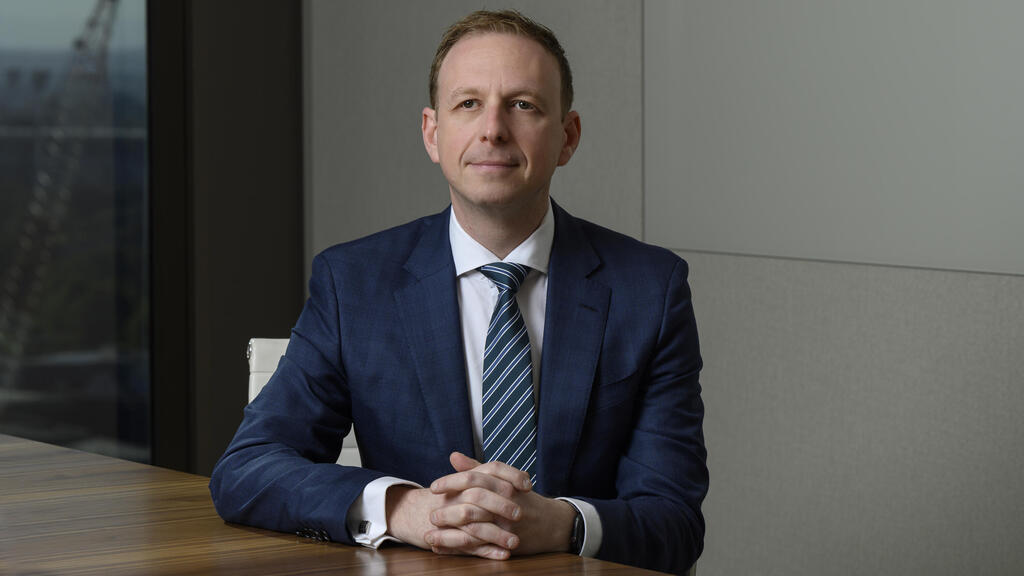Getting your Trinity Audio player ready...
Nothing prepared Jeremy Leibler for last December's Thursday night in Melbourne, Australia. He had encountered antisemitism before, worked to support Jewish students who felt unsafe on campus, engaged with political figures to combat hatred and sought to protect the Jewish community. But the sight of a synagogue in flames stunned everyone, evoking dark moments in history.
Leibler, president of the Zionist Federation of Australia, understands the weight of the image. Like many in the country’s Jewish community, he is a descendant of Holocaust survivors who sought refuge on the distant continent, hoping for a peaceful life far from a Europe that had failed them.
5 View gallery


Torah scroll rescued out of torched synagaogue in Australia
(Photo: Tania Lee / AFP )
Australia’s Jewish population, roughly 120,000 strong, had long realized that modest dream. In a sun-soaked country, largely removed from global conflicts, the community flourished and became an integral part of Australian society. While warning signs had appeared before, the October 7, 2023, Hamas attack in Israel sent shockwaves through the community, ushering in what many consider the most difficult year in Australian Jewish history.
Leibler put it bluntly: "There have never been worse times for Jews in Australia. The synagogue fire was another escalation in the wave of hate we’ve seen on Melbourne’s streets every day this past year. This attack proves that words turn into actions. It’s a stain on our nation and it’s time for political leaders at every level to take real action to eradicate this antisemitism from our lives."
‘The entire community was traumatized’
Australia’s Jewish community is known for its strong Zionist identity and activism. More than 50% of Jewish children attend Jewish schools, with most of the population concentrated in Sydney and Melbourne. Many community members trace their roots to Jews who fled Europe before and after the Holocaust and that historical memory remains deeply ingrained.
"In some ways, the arrival of Holocaust survivors after the war significantly shaped the local Jewish community, making it more Zionist and deeply connected to Israel," Leibler explained. That connection made the impact of October 7 even more profound.
"It hit us on multiple levels. First, almost all of us have family or friends in Israel, and most have visited at least once, so we were deeply worried. Second, I felt an overwhelming sense of unity—before October 7, I’d receive constant calls and messages debating various issues.
5 View gallery


Australian Prime Minister Anthony Albanese at the burned synagogue
(Photo: AFP / Department of the Prime Minister and Cabinet / Australia)
“After the tragedy, there was only one message from everyone: solidarity and support. Third, on a nearly physical level, the brutal attack raised urgent questions about self-defense and personal security. The severity of the assault on Israel, combined with the surge in antisemitism here, triggered deep fears within our community."
Jewish life before October 7
"Antisemitism in Australia was never at the levels seen in Europe or even the U.S.," Leibler noted. "The Jewish community is well-established, successful in business and society, and has had elected officials and prominent figures in many fields. I wore a kippah on campus growing up and felt safe. But after October 7, everything changed.
“The trauma was personal and communal. Media turned to us immediately, and institutions we supported financially—charities, arts groups—signed statements accusing Israel of genocide. It felt like betrayal.”
"It was shocking. People who always spoke out about every minor social issue suddenly couldn’t bring themselves to condemn the rape and murder of Israeli women. I saw senior colleagues, whom I’d worked with on incredible projects, signing petitions accusing Israel of genocide within a week. It left the entire community in trauma."
Get the Ynetnews app on your smartphone: Google Play: https://bit.ly/4eJ37pE | Apple App Store: https://bit.ly/3ZL7iNv
The impact is evident in the numbers: antisemitic incidents in Australia have surged by 700% since October 7, culminating in last week’s synagogue arson.
Do Australians outside the Jewish and Muslim communities care?
"For most Australians, the conflict and war aren’t major concerns. Antisemitism here isn’t necessarily worse than in other countries, but like elsewhere, pro-Palestinian activists have long aligned themselves with progressive movements, leveraging identity politics. Meanwhile, oliticians and institutions failed to lead effectively, allowing the situation to deteriorate.
“When an Australian Jew can be labeled a ‘genocide supporter’ simply for being Zionist, that’s just another form of antisemitism. The reality is that in today’s Australia, being openly Jewish and Zionist comes with a social cost. Some prefer to hide or downplay their identity, which is deeply troubling and will shape the future of Jewish life here."
Who are the pro-Palestinian activists?
"Australia has 800,000 Muslims, many of whom arrived under the country’s lenient immigration policies. The community includes people from Lebanon and Palestinians, among others. Not a single Muslim leader here has condemned the October 7 massacre or the rapes and murders committed that day.
“That speaks volumes. These numbers carry political weight, and with elections approaching, views on the Middle East are increasingly factoring into Australian politics. Even the Greens, supposedly focused on environmental issues, are aligning more and more with Muslim voters to gain support."
The government recently refused entry to former Israeli minister Ayelet Shaked over past statements, a surprising move given that she currently holds no official position. Leibler saw it as part of an irrational pattern.
"Initially, the government understood the situation and affirmed Israel’s right to self-defense. But over time, they shifted the narrative to focus almost exclusively on humanitarian concerns, without acknowledging Hamas’s role in the war.
“Then they called for a ceasefire without addressing what happens afterward or demanding the immediate release of hostages. It made no sense. The decision to bar Shaked was the final straw for many in our community — it signaled that the broad bipartisan support Israel once had in Australia had eroded."
The response: Jews reconnect with their community
One consequence of these changes has been a surge in Jewish communal engagement. "We’re seeing an explosion in attendance at Jewish events and a dramatic rise in membership and activism," Leibler said. "In some cases, participation has doubled. We’re seeing an explosion in attendance at Jewish events... It’s reminiscent of the post-Six-Day War era."
This renewed engagement has also fostered closer ties between Australian Jews and the Israeli expatriate community, known as "Aussraelis," which numbers around 10,000–12,000. Relations between the two groups haven’t always been close, and Leibler acknowledged that the Jewish community bears some responsibility.
"For years, we didn’t do enough to integrate Israelis. They arrived here for various reasons and from diverse backgrounds, and we didn’t always welcome them properly. But we’ve made efforts in recent years to bridge that gap, especially after October 7.
“We now recognize that we’re not ‘owners’ of the Jewish space — every Jew has a place here. Israelis are part of our community, and we’re learning to come together. But it also requires effort on their part to understand our traditions and perspectives."
Is Australia still a good place for Jews to live?
"Australia was once the ‘golden country’ for Jews—a place where they could live fully Jewish lives in freedom... But right now, it’s a difficult place for Jews... The real problem is that, for the first time, Australia has a government that doesn’t fully support Israel’s right to exist. The issue isn’t widespread antisemitism — most Australians aren’t antisemitic.
“Nor is it a matter of physical safety, as in parts of Europe. The real problem is that, for the first time, Australia has a government that doesn’t fully support Israel’s right to exist. When you have a strong, Zionist Jewish community facing that kind of uncertainty, it creates a profound sense of insecurity. This could change but it depends on what actions the government chooses to take."






